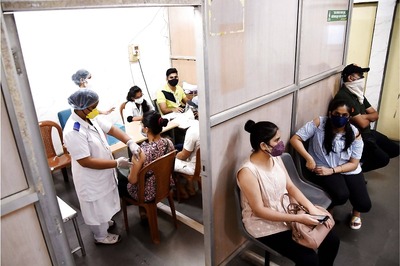
views
About five months ago, on October 1, seven new Defence Public Sector Undertakings (DPSUs) were born out of the erstwhile Ordnance Factory Board (OFB).
Proposed by multiple high-level government committees in the last 20 years, the corporatisation of the Kolkata-headquartered OFB was considered a major reform. One, it came after months of difficult negotiations between the OFB factory workers, who threatened to go on strikes on several occasions, and the defence establishment, including defence minister Rajnath Singh himself.
Two, the idea itself was aimed at breaking the ‘status-quo’ culture of the 246-year-old OFB and transforming it into multiple corporate entities, to be driven by quality and competition.
The defence ministry made this transition smoother than anticipated, but the new undertakings await steps to be transformed into profitable entities, which can produce quality equipment within fixed timelines to meet the needs of their domestic clients and add bulk to India’s defence exports.
Soft Landing
Corporatisation of OFB had yielded seven new DPSUs—Advanced Weapons and Equipment India Limited, Munitions India Limited, Armoured Vehicles Nigam Limited, Troop Comforts Limited, Yantra India Limited, India Optel Limited, and Gliders India Limited.
That they had a soft landing when they became operational on October 1 is evident from the cushioning they received right at the beginning to protect them from any immediate trouble.
For instance, the defence budget for 2022-23 set aside a total of Rs 3,810 crore for these seven new DPSUs, of which, Rs 2,500 crore is for emergency authorisation to meet any immediate operational requirements and Rs 1,310 crore for handholding them in the initial years towards planned modernization in case their financial targets are not realised immediately.
In a recent reply to Parliament, the Centre had said 115 contracts worth Rs 79,834.05 crore are currently available with the new corporations.
The government also said the OFB employees will remain on deemed deputation to the new DPSUs initially for a period of two years and, till such time, they would continue to be subject to “all extant rules, regulations and orders as are applicable to the Central Government servants, including related to their pay scales, allowances, leave, medical facilities, career progression and other service conditions.”
So, while the new firms are comfortably placed at this point, a set of structural and Human Resource (HR) reforms for the DPSUs is essential so that they can aim to be self-reliant by the time this cushion wears off.
Bring in Fresh Talent, Strengthen R&D
A set of HR reforms should ideally be the first priority at this phase.
First, there has to be clarity on whether the government would consider extending the initial deemed deputation period of two years for the OFB employees and, if not, what would be their exact status after this period is over. This would allay much of the fears and uncertainties plaguing the OFB employees.
Secondly, fresh talent should be brought in to the DPSUs, both from the Armed Forces and the private sector, to improve their work culture, enhance production quality, infuse competiveness and bring in accountability.
The Armed Forces, particularly the Indian Army, has been the biggest client of these new DPSUs. But officers from the services do not usually go on deputation to the OFB, except for specific security-related roles, even though equipment manufactured by OFB had the biggest impact on their operational efficiency.
Not only should the Armed Forces be deputed to these corporations in good numbers, particularly for specific projects involving niche technologies, there should also be a greater representation of experienced officers in the Board of Directors of the DPSUs.
Additionally, the DPSUs should put a special focus on talent acquisition from the private sector, with the government focusing on lateral entry of experts in several ministries and other autonomous bodies.
This infusion of fresh talent and perspective in the DPSUs would provide a huge impetus to their transformation, essential to create a dramatic shift in their overall work culture, improve quality of products and adherence to timelines.
This, in turn, will help the DPSUs to significantly contribute towards the government’s aspirations towards achieving Atmanirbharta in defence, and emerging a major arms exporter.
Another intervention critical at this juncture is to strengthen Research and Development (R&D) in each of the DPSUs so that they can focus on newer, niche defence technologies and also conduct adequate market research to identify best practices from across the globe, which can be implemented in the firms. The 2022-23 defence budget has earmarked research funds for the DPSUs and efforts should be undertaken for the full utilisation of such funds.
Improve Monitoring, Give Performance-Linked Incentives
Earlier the Armed Forces were captive customers of the OFB, and a no-objection certificate was needed, if they were to buy any equipment in the production line of the ordnance factories from other sources.
But, now the DPSUs will have to compete with the private sector.
This looks like a humungous task, primarily because the defence services had traditionally been unhappy with the quality of equipment produced by the factories.
In 2020, the Army in an internal assessment had noted that losses to the tune of nearly Rs 1,000 crore were incurred by the Indian exchequer because of poor quality OFB equipment, which also caused over 400 accidents and 27 deaths between 2014 and 2019, a claim subsequently refuted by the OFB.
But then, multiple audit reports by the Comptroller and Auditor-General (CAG) in the last decade had pulled up the OFB for its dismal performance in meeting production targets, hyping up its performance and for producing poor quality ammunition.
Transforming the loss-making OFB into seven profitable DPSUs, with the same set of workforce, will need a stronger monitoring of the various projects underway.
Other reforms such as providing production-linked incentives to the DPSUs can also be considered by the government to cut costs, improve efficiency of workforce and raise the bar on quality, without which they would end up meeting the same fate of privatisation as many other PSUs did or are in the pipeline.
Read all the Latest News India and Breaking News here



















Comments
0 comment